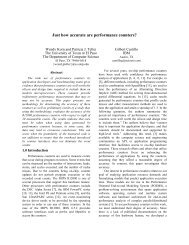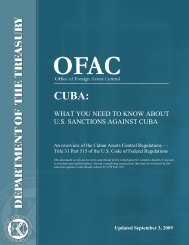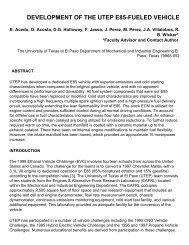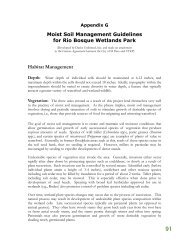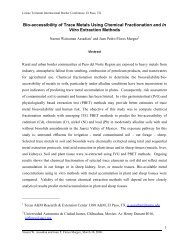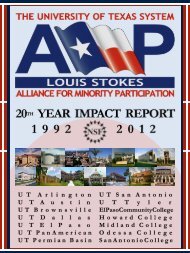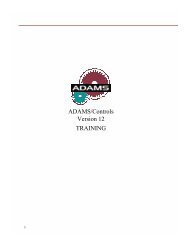Guide for the Care and Use of Laboratory Animals - Office of ...
Guide for the Care and Use of Laboratory Animals - Office of ...
Guide for the Care and Use of Laboratory Animals - Office of ...
- No tags were found...
You also want an ePaper? Increase the reach of your titles
YUMPU automatically turns print PDFs into web optimized ePapers that Google loves.
206 GUIdE FOR ThE CARE ANd USE OF LAbORATORy ANIMALSrespect to rodent housing systems <strong>and</strong> monoclonal antibody production,<strong>the</strong> characterization <strong>of</strong> various animal models, underst<strong>and</strong>ing <strong>the</strong> etiopathogenesis<strong>of</strong> endocrinologic disorders affecting laboratory animal species, <strong>and</strong>development <strong>and</strong> analysis <strong>of</strong> novel <strong>the</strong>rapeutic strategies. Throughout hiscareer, Dr. Lipman has been extensively involved in <strong>the</strong> postgraduate training<strong>of</strong> laboratory animal specialists.Paul Locke, MPH, JD, DrPH, an environmental health scientist <strong>and</strong> attorney,is Associate Pr<strong>of</strong>essor at <strong>the</strong> Johns Hopkins University Bloomberg School<strong>of</strong> Public Health in <strong>the</strong> Department <strong>of</strong> Environmental Health Sciences,Division <strong>of</strong> Toxicology. He holds an MPH from Yale University School <strong>of</strong>Medicine, a DrPH from <strong>the</strong> Johns Hopkins University Bloomberg School<strong>of</strong> Public Health <strong>and</strong> a JD degree from V<strong>and</strong>erbilt University School <strong>of</strong>Law. Prior to joining <strong>the</strong> Department <strong>of</strong> Environmental Health, he was <strong>the</strong>Deputy Director <strong>of</strong> <strong>the</strong> Pew Environmental Health Commission <strong>and</strong> <strong>the</strong>Director <strong>of</strong> <strong>the</strong> Center <strong>for</strong> Public Health <strong>and</strong> Law at <strong>the</strong> Environmental LawInstitute. Dr. Locke’s research <strong>and</strong> practice focus on how decision makersuse environmental health science <strong>and</strong> toxicology in regulation <strong>and</strong> policymaking <strong>and</strong> how environmental health sciences influence <strong>the</strong> policy-makingprocess. His areas <strong>of</strong> study include alternatives to animal testing inbiomedical research, with particular emphasis on toxicity testing. He alsomaintains an active research program in radiation studies <strong>and</strong> radiation protectionpolicy. Dr. Locke directs <strong>the</strong> Doctor <strong>of</strong> Public Health degree programin <strong>the</strong> Department <strong>of</strong> Environmental Health Sciences <strong>and</strong> is co-director <strong>of</strong><strong>the</strong> Johns Hopkins certificate program in Humane Science <strong>and</strong> Toxicology.From 2004 until 2009 he was a member <strong>of</strong> <strong>the</strong> National Academy <strong>of</strong> SciencesNuclear <strong>and</strong> Radiation Studies Board, <strong>and</strong> has served on five NationalAcademy <strong>of</strong> Sciences/National Research Council expert committees. He isadmitted to practice law be<strong>for</strong>e <strong>the</strong> bars <strong>of</strong> <strong>the</strong> states <strong>of</strong> New York <strong>and</strong> NewJersey, <strong>the</strong> District <strong>of</strong> Columbia, <strong>the</strong> United States Court <strong>of</strong> Appeals <strong>for</strong> <strong>the</strong>Second Circuit <strong>and</strong> <strong>the</strong> United States Supreme Court.The Honorable John Melcher, DVM, a graduate <strong>of</strong> <strong>the</strong> College <strong>of</strong> VeterinaryMedicine <strong>of</strong> <strong>the</strong> Iowa State University, was a practicing veterinarian in<strong>the</strong> state <strong>of</strong> Montana until 1969, in which year he was elected to <strong>the</strong> U.S.House <strong>of</strong> Representatives. He served as a Congressman <strong>for</strong> 8 years <strong>and</strong> asa Senator <strong>for</strong> 12 years. In both <strong>the</strong> House <strong>and</strong> <strong>the</strong> Senate, Senator Melcherwas noted <strong>for</strong> his interest in agriculture, protection <strong>of</strong> public l<strong>and</strong>s, notablyForest Service <strong>and</strong> Bureau <strong>of</strong> L<strong>and</strong> Management l<strong>and</strong>s, <strong>and</strong> animal welfare<strong>and</strong> animal health protections. In 1984 he contributed to <strong>the</strong> Animal WelfareAct with an amendment requiring consideration <strong>of</strong> <strong>the</strong> psychologicalwell being <strong>of</strong> primates used in medical research. After retiring from Congress,Senator Melcher established a second career as a consultant <strong>for</strong> <strong>the</strong>




